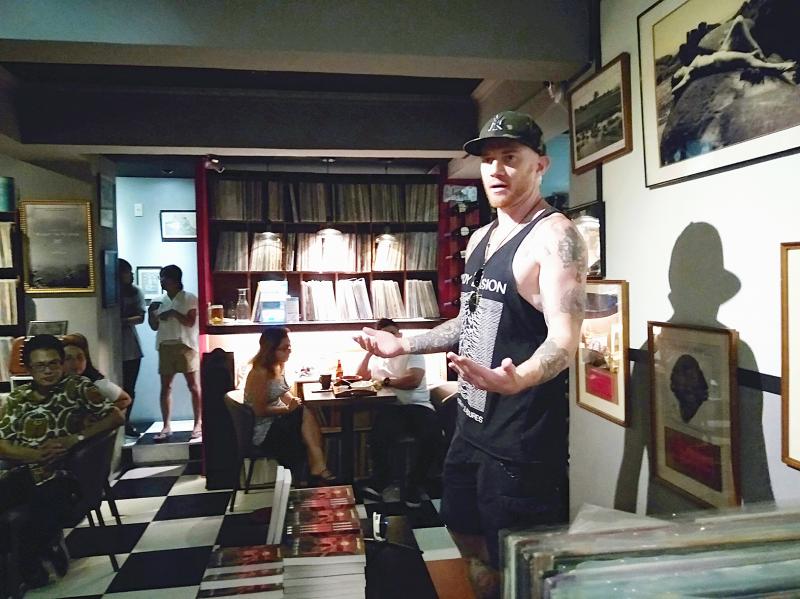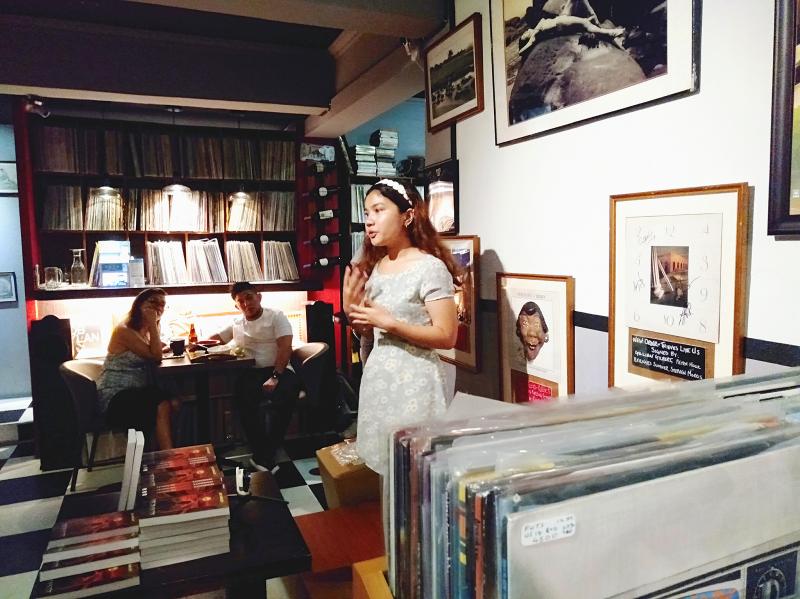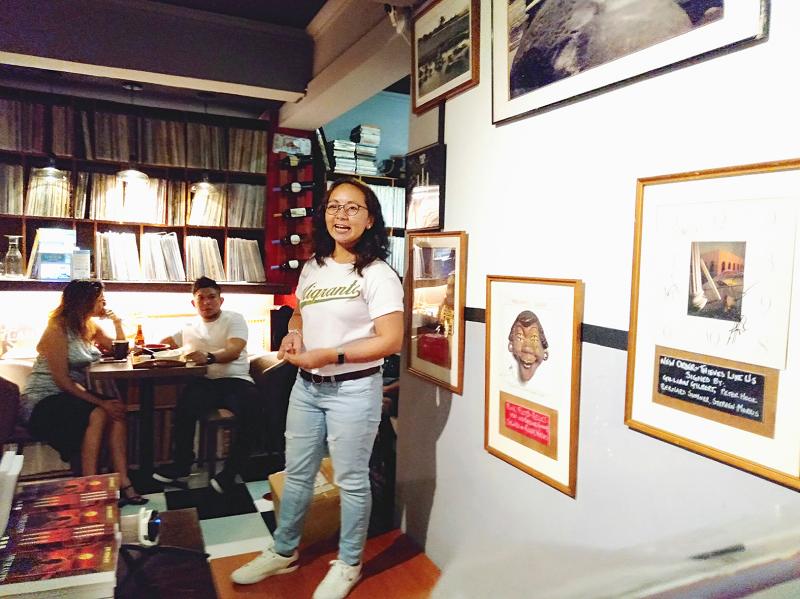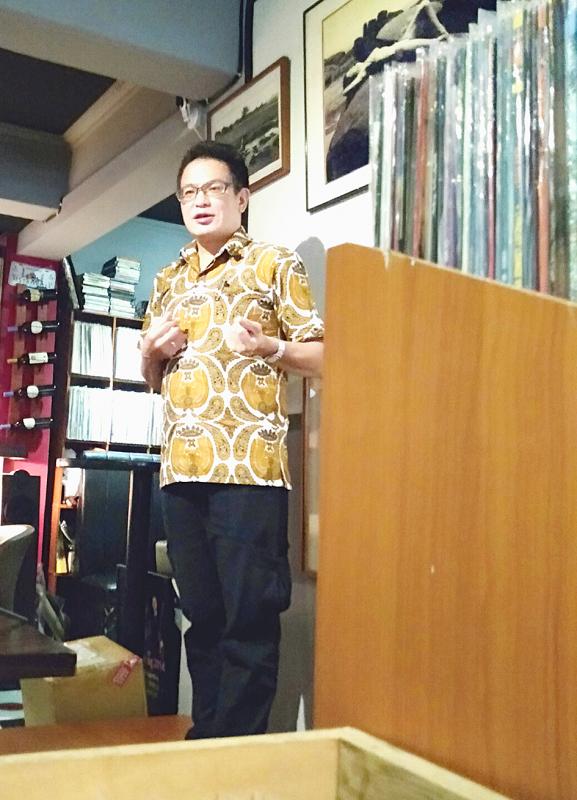In language that belies her cherubic appearance, Julia Mariano calls for “revolutionary rage.”
She is speaking at Taipei’s Vinyl Decision bar, alongside a portrait of Bob Dylan. This is the language of protest, for sure, but rather than channeling voices from a bygone era, Mariano is demanding that people take action right now.
The occasion is the launch of Taipei-based Canadian writer Joe Henley’s latest novel, Migrante (reviewed on page 14 in the Taipei Times on July 30), which details the tribulations of a Filipino migrant worker in Taiwan, and the largely Western composition of the audience is not lost on the speaker.

Photo: James Baron, Taipei Times
“I’m so grateful that Joe wrote this book and that all of you are here,” says Mariano, a sophomore at National Taipei University of Nursing and Health Sciences. “It’s nobody’s fault if you’re born into privilege, but I hope that we aim to maximize our platform and our privileges to fight for a world that is more equal.”
Rather than simply sympathy, Mariano calls for anger, “because anger is the emotion of injustice.”
Given her background, Mariano’s fiery rhetoric is understandable. The daughter of a doctor who was himself compelled to seek work in Taiwan to fund his college tuition, she remembers “breaking down at school because I couldn’t go home to my dad.”

Photo: James Baron, Taipei Times
In addition to being spokesperson for Migrante International — Taiwan Chapter, a rights group for migrant workers, Mariano is a member of Anakbayan, a militant Filipino student movement with branches worldwide. The organization is fiercely critical of Philippine President Rodrigo Duterte and has proved a nagging thorn in his side.
Disapproval of Duterte, even from this side of the Luzon Strait, is risky. In April, a Filipina caregiver who criticized the president on Facebook was threatened by labor authorities in Manila who called for her deportation
Gilda Banugan, chairwoman of Migrante International — Taiwan Chapter, who spoke briefly at the event, highlights the deep roots of the problem.

Photo: James Baron, Taipei Times
“The Philippines has long been a semi-colony of the US, being tied to it by unfair treaties,” she says later through Facebook, citing the labor export policy introduced under the dictatorship of former President Ferdinand Marcos as kickstarting a healthcare brain drain.
“It definitely is not a problem that started in the Duterte administration, but it has worsened since the outbreak of COVID-19, where healthcare workers are overworked and underpaid.”
Many who have become sick or died fighting the virus haven’t even received hazard pay, exacerbating the desperation to find an alternative.

Photo: James Baron, Taipei Times
Lennon Wong (汪英達), director of Serve the People Association, an NGO that runs migrant worker shelters, also took the stage on Saturday. Wong, whose work helped inspire Henley’s novel, delivered an indictment of a rotten system.
He notes that most workers pay exorbitant placement fees at home, before having monthly service fees deducted by Taiwanese brokers. Although direct hiring exists in the Philippines and in limited cases for Indonesian factory workers, the governments of those countries don’t support it.
“They have a strange mindset, saying ‘We need a broker because, if we don’t have it, there’s no one to take care of them and there might be human trafficking,’” he says. “I want to slap them and say ‘It’s totally the opposite — brokers are the source of human trafficking!’”
While Wong doesn’t oppose the stance of groups such as Taiwan International Workers Association, which calls for the abolition of the brokerage system, he advocates a nuanced approach.
“In reality, a bunch of people have worked in this industry for 20 years. How can you just kill their industry?” he asks, rhetorically.
Instead, following the principles of fair recruitment espoused by the International Labor Organization and International Organization of Migration, it should be the employers rather than the workers that pay placement fees.
Several companies are already on board.
“We have a joint project with a French NGO — they work for some French brands who have suppliers in Taiwan. We want to expand this,” he says. “Under the Responsible Business Alliance … [with] some big companies, it’s already like that,” he says, noting that most Apple suppliers foot employee placement fees. “I believe that under this trend, it’s a win-win situation.”
This includes the brokers.
“It’s such a corrupted system that everyone is exploited — even the brokers,” says Wong. “[They] don’t charge a single dollar to the employer — can you believe that? On the contrary, brokers pay the factory employers in kickbacks to safeguard their quota, to keep their business.”
The brokers are also expected to provide dormitory and translation services, says Wong. “So where does the money come from? Obviously from the workers. So, if we can force the employers to pay it, the brokers won’t really lose money. This is what we’re trying to achieve.”
Like Mariano, Wong expresses outrage at the abuses he has encountered. Yet, he advocates a measured response. Concluding the evening’s speeches, Henley re-emphasizes this point. “We should be angry but our anger should have focus,” he says. “Anger without focus is useless.”

June 2 to June 8 Taiwan’s woodcutters believe that if they see even one speck of red in their cooked rice, no matter how small, an accident is going to happen. Peng Chin-tian (彭錦田) swears that this has proven to be true at every stop during his decades-long career in the logging industry. Along with mining, timber harvesting was once considered the most dangerous profession in Taiwan. Not only were mishaps common during all stages of processing, it was difficult to transport the injured to get medical treatment. Many died during the arduous journey. Peng recounts some of his accidents in

“Why does Taiwan identity decline?”a group of researchers lead by University of Nevada political scientist Austin Wang (王宏恩) asked in a recent paper. After all, it is not difficult to explain the rise in Taiwanese identity after the early 1990s. But no model predicted its decline during the 2016-2018 period, they say. After testing various alternative explanations, Wang et al argue that the fall-off in Taiwanese identity during that period is related to voter hedging based on the performance of the Democratic Progressive Party (DPP). Since the DPP is perceived as the guardian of Taiwan identity, when it performs well,

A short walk beneath the dense Amazon canopy, the forest abruptly opens up. Fallen logs are rotting, the trees grow sparser and the temperature rises in places sunlight hits the ground. This is what 24 years of severe drought looks like in the world’s largest rainforest. But this patch of degraded forest, about the size of a soccer field, is a scientific experiment. Launched in 2000 by Brazilian and British scientists, Esecaflor — short for “Forest Drought Study Project” in Portuguese — set out to simulate a future in which the changing climate could deplete the Amazon of rainfall. It is

The Taiwan People’s Party (TPP) on May 18 held a rally in Taichung to mark the anniversary of President William Lai’s (賴清德) inauguration on May 20. The title of the rally could be loosely translated to “May 18 recall fraudulent goods” (518退貨ㄌㄨㄚˋ!). Unlike in English, where the terms are the same, “recall” (退貨) in this context refers to product recalls due to damaged, defective or fraudulent merchandise, not the political recalls (罷免) currently dominating the headlines. I attended the rally to determine if the impression was correct that the TPP under party Chairman Huang Kuo-Chang (黃國昌) had little of a